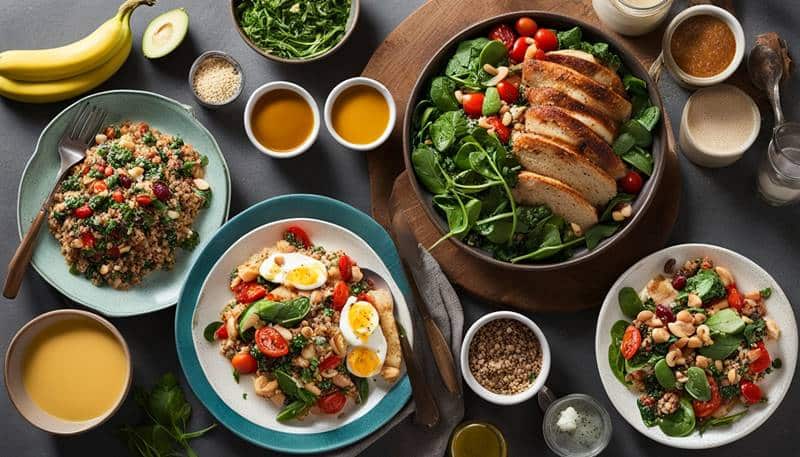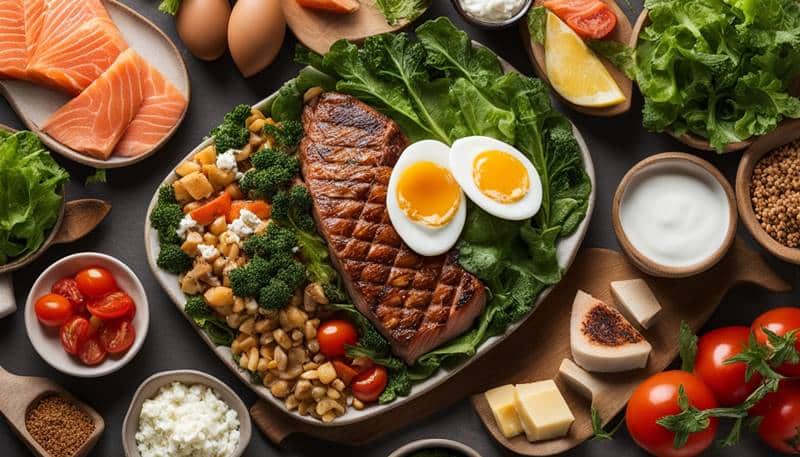Protein is a crucial component of a healthy diet. It’s the building block of life, essential for muscle growth, repair, and overall well-being. If you’re looking to boost your intake of healthy protein, you’re in the right place. This guide will explore 18 foods high in protein that can help you maintain a balanced diet and reach your nutritional goals.
Whether you’re an athlete, a fitness enthusiast, or simply someone who wants to improve their diet, understanding sources of protein is key. From lean meats to plant-based options, there’s a wide variety of foods that can help you meet your daily protein needs. Some people even turn to protein powder for an extra boost, but whole foods should always be your primary source.
Did you know that the recommended dietary allowance for protein is 0.8 grams per kilogram of body weight? That’s about 54 grams for a 150-pound person. But your individual needs may vary based on factors like age, activity level, and health goals. For instance, older adults and very active individuals might need up to 1.2 to 2 grams per kilogram of body weight.
In the following sections, we’ll dive into various high-protein foods, including both animal and plant-based sources. Whether you prefer chicken breast with its impressive 26 grams of protein per 4-ounce serving, or plant-based options like tempeh boasting 31 grams per cup, you’ll find plenty of options to keep your meals interesting and nutritious.
Key Takeaways
- Protein is essential for muscle growth, repair, and overall health
- The recommended daily protein intake varies based on individual factors
- Both animal and plant-based sources can provide high-quality protein
- Whole foods should be the primary source of protein in your diet
- A balanced diet with varied protein sources supports optimal health
Understanding Protein: The Essential Nutrient
Protein plays a crucial role in our bodies. It’s the building block for muscles, tissues, and organs. Foods high in protein are vital for a balanced diet. Let’s explore why protein is so important and how much you need.
What is protein and why do we need it?
Protein is a macronutrient made up of amino acids. Your body uses it to repair cells, build muscle, and boost immunity.



The best sources of protein include lean meats, fish, eggs, and plant-based options like beans and nuts.
How much protein should you consume daily?
The National Academy of Medicine suggests a minimum of 0.8 grams of protein per kilogram of body weight daily. For a 140-pound person, that’s about 50 grams of protein. A 200-pound individual needs around 70 grams. Your protein needs may vary based on age, activity level, and health goals.
| Body Weight | Recommended Daily Protein Intake |
| 140 lbs (64 kg) | 50 grams |
| 200 lbs (91 kg) | 70 grams |
Signs of protein deficiency
Not getting enough protein can impact your health. Watch out for these signs:
- Muscle weakness
- Slow wound healing
- Brittle hair and nails
- Increased hunger
Remember, both animal and plant-based foods can be excellent protein sources. Aim to include a variety of protein-rich foods in your diet for optimal health and nutrition.
High Protein Foods from Animal Sources
Animal-based foods offer a wealth of healthy protein sources that are easily absorbed by your body. Let’s explore some top choices for boosting your protein intake.
Lean Meats: Powerhouses of Protein
Chicken, turkey, and beef are excellent sources of protein. A 3-ounce serving of skinless chicken breast packs a whopping 32 grams of protein.



Turkey breast is close behind with 30 grams, while lean beef provides 28 grams per serving. Choose cuts that are at least 93% lean to minimize saturated fat intake.
Fish and Seafood: Heart-Healthy Options
Fish like salmon and tuna are rich in protein and heart-healthy omega-3 fatty acids. A 3-ounce serving of baked salmon offers 25 grams of protein. Tilapia provides even more, with 26 grams per serving. Shellfish lovers can enjoy shrimp, which contains 17 grams of protein per 3-ounce serving.
Eggs and Dairy: Versatile Protein Sources
Eggs are a budget-friendly protein option, with one large egg containing 6 grams. Greek yogurt is another protein powerhouse, offering 9 grams per 100 grams. Cottage cheese is even more protein-dense, providing 12 grams per 100 grams.
| Food | Protein (g per 100g) | Serving Size |
| Chicken Breast | 32 | 3 oz |
| Turkey Breast | 30 | 3 oz |
| Lean Beef | 28 | 3 oz |
| Salmon | 25 | 3 oz |
| Greek Yogurt | 9 | 1/3 cup |
Remember, moderation is key when consuming animal proteins. Aim for a balanced diet that includes a variety of protein sources to ensure you’re getting all essential nutrients.
Plant-Based High Protein Foods
Plant-based proteins are gaining popularity for their health benefits and environmental sustainability. These foods are high in protein and packed with essential nutrients, making them excellent choices for a balanced diet.
Legumes: Powerhouses of Plant Protein
Legumes are among the best plant-based protein sources. Lentils offer 18 grams of protein per cooked cup, while beans like kidney, black, and chickpeas provide about 15 grams. These foods are not only high in protein but also rich in fiber, supporting digestive health.
Nuts and Seeds: Small but Mighty
Nuts and seeds pack a protein punch in small servings. Hemp seeds contain 9 grams of protein in just 3 tablespoons. Chia seeds offer 5 grams per 2 tablespoons, while sunflower seed kernels provide 7 grams in a quarter cup.
Whole Grains and Pseudo-cereals: Complete Proteins
Quinoa and amaranth are pseudo-cereals that deliver 8-9 grams of protein per cooked cup. Ezekiel bread, made from sprouted whole grains, contains about 8 grams of protein per two slices. These options are great for those looking to increase their protein intake without relying on animal products.
| Food | Protein Content | Serving Size |
| Tempeh | 34 grams | 1 cup |
| Lentils | 18 grams | 1 cup cooked |
| Edamame | 18 grams | 1 cup cooked |
| Quinoa | 8 grams | 1 cup cooked |
For those seeking convenience, protein powder made from plant sources like pea or hemp can be a great addition to smoothies or baked goods. These options provide an easy way to boost your protein intake while maintaining a plant-based diet.
High Protein Foods for Special Diets
If you’re following a special diet, you can still find plenty of foods high in protein to meet your nutritional needs. Vegetarians can rely on eggs, dairy, and plant-based proteins like tempeh and tofu. For vegans, legumes, nuts, and seeds are excellent sources of protein. A cup of cooked lentils, for example, packs 18 grams of protein, making it one of the best sources of protein for plant-based diets.
Those with lactose intolerance can opt for lactose-free dairy products or plant-based alternatives. Gluten-free dieters have numerous options, including lean meats, fish, and gluten-free grains like quinoa. For low-carb diets, lean meats, fish, and eggs are top choices. A 3-ounce serving of skinless chicken breast provides a whopping 27 grams of protein, while a large egg contains 6 grams.
Remember, protein needs vary based on factors like age and activity level. Most healthy adults require about 0.8 grams of protein per kilogram of body weight daily. This translates to roughly 55 grams for an average sedentary man and 45 grams for an average sedentary woman. A 2020 study suggests that older individuals may need more protein to maintain muscle mass. To ensure your special diet meets all nutritional requirements, it’s wise to consult with a registered dietitian.
FAQ
What is protein and why is it important?
How much protein should I consume daily?
What are the signs of protein deficiency?
What are some high-protein foods from animal sources?
What are some high-protein plant-based foods?
Are there high-protein options for special diets?
Credit: Source link

















